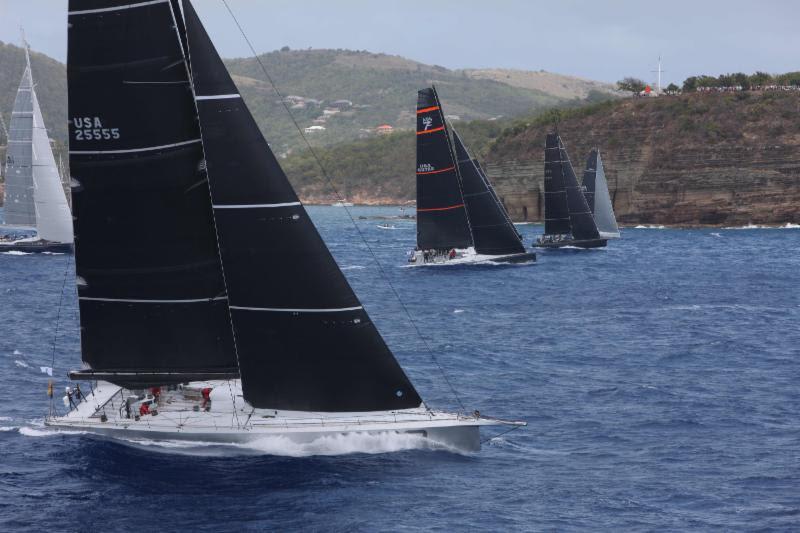
Record fleet sets off on record pace in 2018 RORC Caribbean 600
by Louay Habib 19 Feb 2018 19:04 PST
20 February 2018

On record pace, George David's American Maxi Rambler 88 and the IRC Zero & Superyacht fleet at the start of the RORC Caribbean 600 off Fort Charlotte in Antigua today © RORC / Tim Wright / Photoaction.com
A record 84 yachts started the 2018 RORC Caribbean 600 in Antigua today; the largest fleet assembled in the ten-year history of the race. The impressive armada set off in unstable conditions with squalls producing a wind range of over 20 knots, and as little as 10, with some big shifts in direction. High seas and strong trade winds are expected for the race, with the anticipation of record breaking pace. At 1600 AST Rambler 88, Proteus and Warrior were ahead of the monohull race record.
Peter Aschenbrenner's Irens 63 Paradox was launched at the start and led the 11-strong multihull fleet, reaching Barbuda in just two hours. George David's American Maxi Rambler 88 got away well at the outer end of the line, tacking immediately to smoke upwind in a halo of spray. Rambler 88 took under an hour to round Green Island before unfurling reaching sails to blast towards Barbuda at well over 20 knots of boat speed. Ludde Ingvall's Australian Maxi CQS developed a technical problem shortly after the start and returned to Antigua to effect repairs, as per the rules of the race.
"It's incredible that the weather for the start of the 10th edition was exactly the same as the first race in 2009," commented Eddie Warden Owen, RORC Chief Executive. "Today's start is probably the windiest that we've had for some years, with rain squalls coming through during the start sequence, then sunshine; typical Antiguan conditions. We have a fantastic fleet of 84 boats setting off in this record-fleet."
George Sakellaris' American Maxi72 Proteus was just four minutes behind Rambler 88 at Green Island, lying just east of Antigua. USMMA Sailing Foundation's American Volvo 70 Warrior and Jens Kellinghusen's German Ker 56 Varuna were all in hot pursuit. Two Superyachts enjoyed a close battle at the start which is likely to rage for the whole of the race. The Dixon 100 Danneskjold was just 13 seconds ahead of the Southernwind 102 Farfalla at Green Island.
Catherine Pourre's French team racing Eärendil leads the Class40s after a tough beat to Green Island. Eärendil has stretched out a one mile lead ahead of Louis Burton's BHB and American John Niewenhous' Loose Fish.
In IRC One, Christian Kargl's Austrian More 55 Pixel, skippered by Michael Gilhofer is provisionally leading the class under IRC. Philippe Frantz's French NM43 Albator is second, with Olivier Rapeaud's Capo Di Fora in third.
In IRC Two, Scarlet Island Girl, owned by Ossie Stewart and skippered by Ross Applebey got a great start and provisionally lead the class. A tense battle is expected for the race and the start was indicative of this. Ballytrim, EH01, Avanti and Quokka are all fighting for the lead.
In IRC Three, Conor Fogerty's Irish Sunfast 3600, Bam got away to an impressive start, as did Jonty and Vicki Layfield's Swan 48 Sleeper X. Richard Palmer racing his British JPK 10.10 Jangada Two Handed with Jeremy Waitt also got a great getaway.
Quick Links:
Ludde Ingvall and his CQS team have taken the very difficult decision to retire from the RORC Caribbean 600 race, this was due to an undiagnosed problem with the engine that runs the hydraulic systems on the boat.
Explaining the situation they found themselves in before the start Ludde said, "we found out fairly quickly that we had an electronic issue with the software, which on our boats the engine drives hydraulics, hydraulics runs every winch, our canard which is the rudder in front, it runs the DSS board, and runs the keel as well as propulsion.
"The problem we had was that four times the engine cut out in the middle of what we were doing and we didn't understand why."
As always, Ludde's main concern was safety, and if the engine cut out during a critical manoeuvre lives could be at risk. After discussing the situation with his watch captains and safety officer it was decided to retire from the race.
Continuing his explanation Ludde told the race control, "we started with the keel in the middle, which is why we were so slow, and with little sails. We decided to go to the top of the island and if by the top of the island we haven't got things sorted, we won't continue."
Ludde expressed his huge disappointment, particularly for the young sailors who had travelled a long way to take part in the race. However with the nature of the Caribbean 600 having a course that goes close to a lot of island, and through some restricted channels, if the engine problem re-occurred they would find themselves in a very difficult situation.
Quick Links